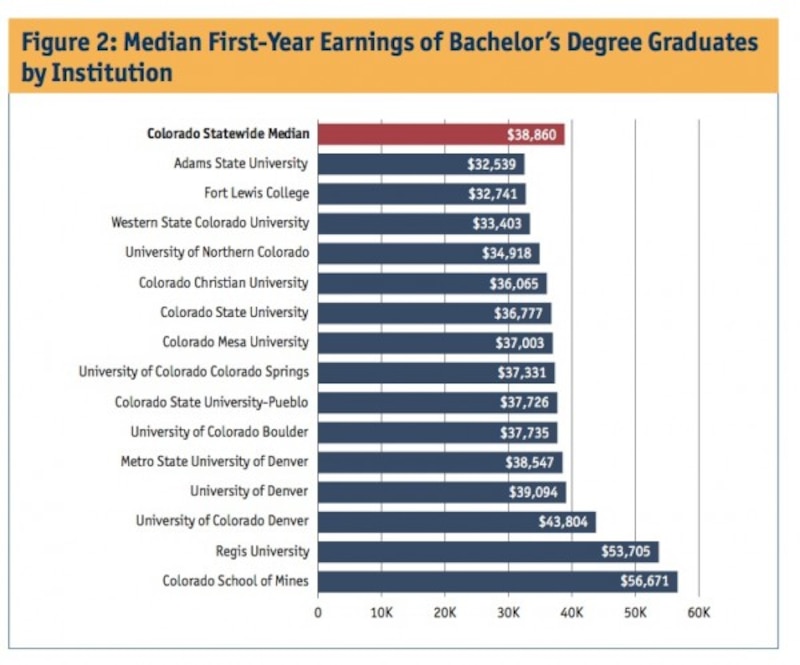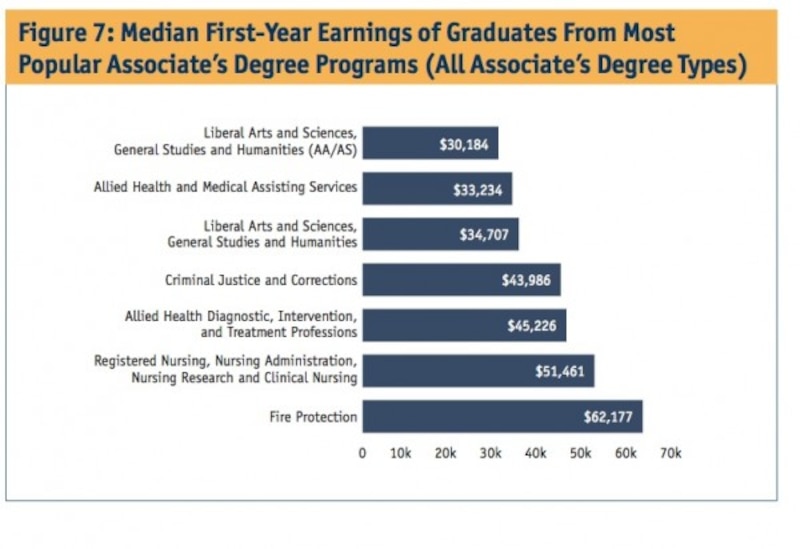One year after graduation, students with applied science degrees from the state’s two-year colleges earn nearly $7,000 more than graduates with bachelor’s degrees from four-year colleges and universities, according to a new study and database.

Do you want to make good money right after graduation? Study computer science, engineering, medical fields or business. Want to be broke? Pursue film studies, philosophy or history.
Those are some of the conclusions that can be drawn about the initial value of college degrees from the College Measures database that was unveiled Wednesday during a news conference at Denver’s South High School.
The College Measures tool, which allows users to search by degree or by institution to find first-year earnings, is the product of collaboration between the Colorado Department of Higher Education and College Measures, a for-profit partnership between the American Institutes for Research and Matrix Knowledge Group. A Lumina Foundation grant funded the bulk of the project.
It doesn’t include harder-to-quantify information, such as happiness or job satisfaction.
“The associate’s degree is the hidden gem in American higher education,” College Measures President Mark Schneider said. “Not everyone needs a bachelor’s degree.”
Schneider, while saying a bachelor’s degree doesn’t have a lot of value in the short-term, said he doesn’t “hate” liberal arts.
“I have a liberal arts degree,” Schneider said. “But it’s a serious question about what the value of those are. You may have a lot of life satisfaction, but if you’re living in your mum’s basement and can’t feed yourself, life satisfaction could be hard to come by.”
Lt. Gov. Joe Garcia, a parent of four – one now in college – said he has spent considerable time as a parent and as a college president counseling thousands of kids and families about the value of a college degree.
“I wished I had a tool like the one we’re making available now,” Garcia said. “As students and families think about increased debt load we need to provide them with the kind of information they need.”
Key findings
- Colorado graduates working in Colorado can earn, on average, $20,000 more in their early years of employment compared to a high school graduate, who earns an average of $25,000.
- Graduates with applied science degrees earn about $15,000 more than students who completed the associate of arts degree or associate of sciences degree.
- The median first-year earnings of bachelor’s degree recipients statewide is around $39,000. However, there is a wide range in earnings according to field of study. First-year earnings range from less than $30,000 for fine and studio arts graduates to more than $50,000 for registered nursing graduates.
Some of the news is not surprising. Higher demand translates into higher salaries. To that end, graduates in health and business earn more than graduates with liberal arts degrees.
But the data shows that not all business degrees, for instance, are created equal.
Take business administration, management and operations. A $20,000 difference is found in the first-year earnings of people who graduated in these fields from the University of Denver (more than $59,000) and the University of Colorado at Colorado Springs ($39,000). Although part of that difference is attributable to differences in the local job markets, there is a $16,000 difference in the earnings of graduates from the University of Denver and University of Colorado Denver, both located in the same metropolitan area.
Generally speaking, graduates from the Colorado School of Mines command the highest beginning salaries – about 45 percent higher than the state median.
Graduates of private Regis University also do quite well in the labor market, with median first-year earnings about 38 percent higher than the state median. One reason for this is that Regis graduates generally are older than grads from other campuses in Colorado and have been in the labor market for years.
CU raises questions about the findings
The state’s flagship campus – the University of Colorado at Boulder – doesn’t rank highly in College Measures, with its bachelor’s degree recipients earning less than the state median salary in their first year of work.
The companion report on College Measures notes that CU-Boulder attracts a lot of out-of-state students and that many of its most successful grads may seek employment or graduate degrees in other states.
CU system spokesman Ken McConnellogue said that there are many caveats about the data. For instance, only 26 percent of CU-Boulder’s graduates with bachelor’s degrees remain in Colorado the first year after graduation. That’s compared to 80 percent of graduates from the Metropolitan State University of Denver, for instance.
Furthermore, a liberal arts degree from a reputable university has value way beyond what a graduate earns their first year out, he said.
“This is a snapshot in time,” McConnellogue said. “It can be useful, but the value of a college degree is measured over a lifetime. … It’s important for people to take the long view. No one measure can give people an accurate view.”
Furthermore, McConnellogue noted that the study was done during the recent economic recession.
Garcia and others involved College Measures said the plan is to include data that will examine earnings over three, five and 10 years to get a more accurate picture of the value of specific degrees from specific institutions.
Helping families make good choices
The point of all this information, of course, is to help students and families make the best decisions when it comes to post-secondary education and the accompanying debt. While there is no guarantee of specific earnings upon graduation, the ranges of first-year earnings listed in the tool can serve as a guide for solid financial planning.
The report cites advice from Mark Kantrowitz, an expert in student financial aid, who says that education debt should be less than expected starting salary after graduation. Even better, student loan debt should be less than 50 percent of starting salary.
The College Measures data includes college graduates from Colorado public colleges and universities and from three private institutions with records in the state’s unemployment insurance wage database, or 61,800 graduates between 2006 and 2010 representing 26 percent of the graduate pool. To be included, graduates must be employed in Colorado and earning at or above the Colorado minimum wage.
The numbers don’t capture any for-profit institutions of higher education. Nor does it include graduates who continued their education after earning a credential, including those enrolling in graduate school or transferring to another college in Colorado and who are full-time students. It also doesn’t include graduates who left the state, who work for the federal government or who were self-employed.
College Measures is also up and running in Arkansas, Virginia, Tennessee. Next month, Florida, Texas and Nevada’s websites will come online.
“States have been sitting on a treasure trove of information for a long time,” College Measures President Schneider said. “That’s one thing that has driven me crazy. All these data sit in warehouses. My goal has been to try to create data storefronts, to try to get the information out into the hands of people who could use it to make important decisions.”
Schneider said that most college-bound students and their families have one thing on their mind – good jobs after graduation.
Technical degrees a “hidden gem”
The key finding in the data is the value of associate’s degrees in technical fields.
“Most students say they want a bachelor’s degree,” Schneider said. “But if you can’t do a four-year college degree – you don’t have money or time – a two-year technical degree is something we should respect and honor much more than we do.”
There is some variation in salaries for graduates of different community colleges. For instance, the median wage of graduates from Red Rocks Community College with associate’s general studies degrees is more than $46,000.
That about $6,000 higher than the median wages of graduates from Arapahoe Community College, Pikes Peak Community College and Community College of Aurora.
Jasmine Fox-Suliaman, 16, a junior at South, said the new tool won’t deter her from pursuing her dream of studying fashion journalism and ultimately living and working in New York City.
“It’s important to have tools like this,” she said. “This is a path (that shows) what I have to do in order to survive. It gives me more insight on how I’m going to prepare for the real world. I’m going to have to learn to budget, and not buy the shoes that are my favorites.”


